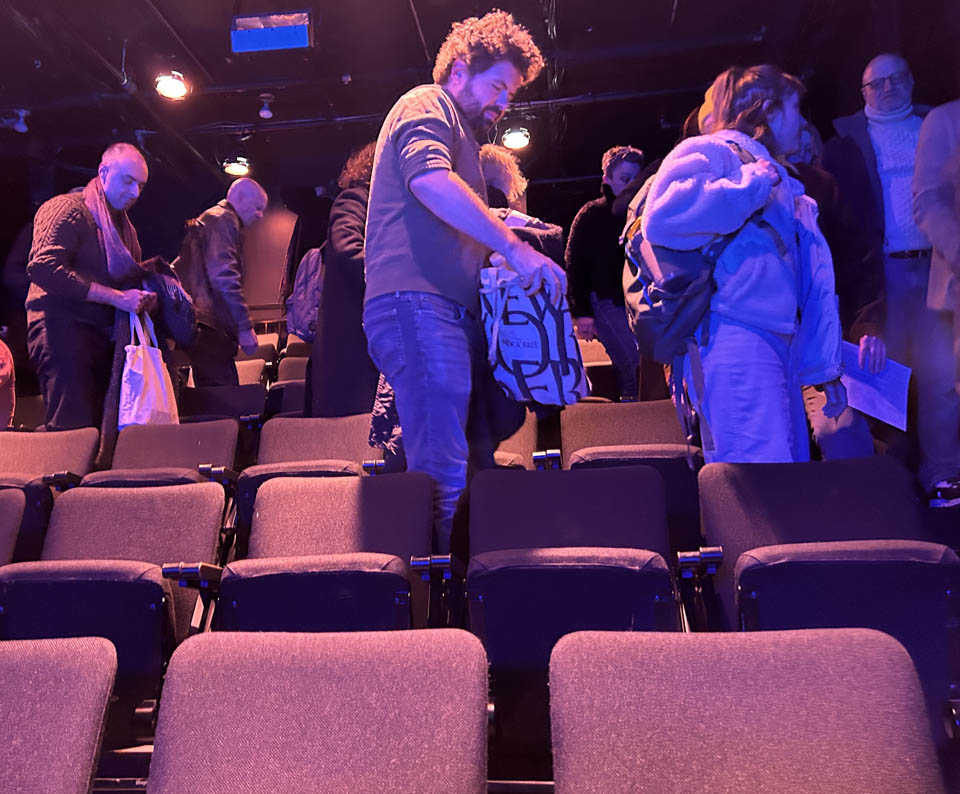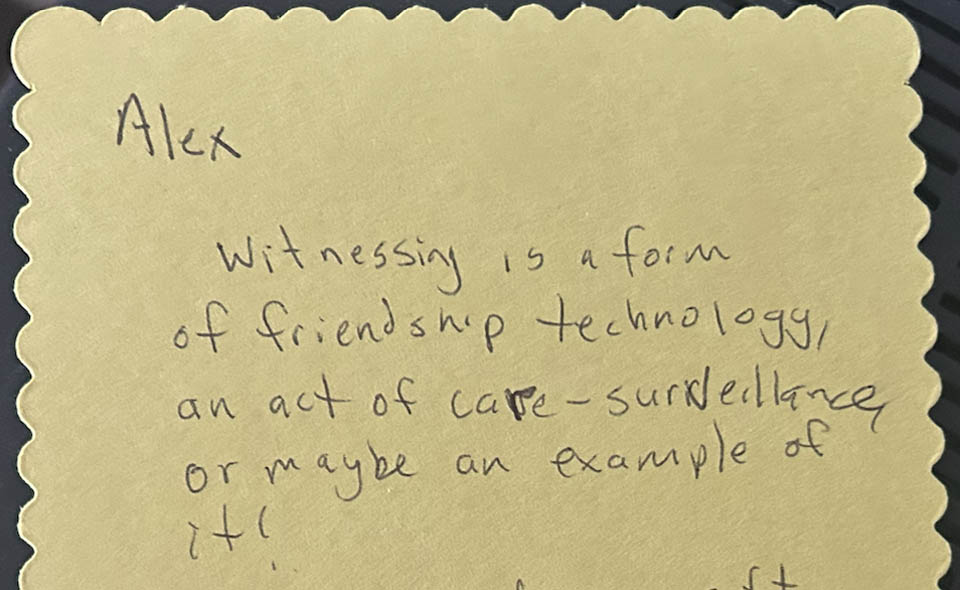After the show, the audience dissembled. They picked up their bags and exited stage right.

Ted and I ambled to the subway. We were in the lower reaches of Soho, just below Canal. And though I previously had written, also about this show, that I never left The Village in the 80s, this wasn’t really true. Soho Rep, where we had just seen Give Me Carmelita Tropicana! is just a block or two away from where the Whitney ISP used to be. I was in this neighborhood all the time back in the day when I was the student, and my teachers were some of downtown’s most infamous artists (I was a sametime grad student at NYU with some kickass teachers, some of whom are still my mentors, and now friends. Shout out Faye Ginsburg!).
Eerily paralleling the show we had just watched about the possibilities, legacies, and loss associated with learning, teaching, place, and inter-generational collaborations of many sorts, the younger member of our party pulled a fast one. Ted asked me to record our conversation as we walked. We’ve done this before, but usually it’s been planned as one part of our conversational writing process.1
The following transcript, rendered by AI, has been slightly edited by me, a human, for you, also people.
Alex: All right, Ted.
Ted: Alex, what day and time is it?
Alex: I don’t know the date. It’s a Sunday. I just took you to see Give Me Carmelita Tropicana! for a Christmas present.
Ted: Yep. Thank you.
Alex: You suggested that you wanted to hijack my blog by talking about being in an audience together. So what do you want to say, or what do you want to ask, or how do you want to proceed?
Ted: Well, I have one big idea, but first I want you to just get on the record your opening thoughts.
Alex: Wow. I wasn’t prepared. Usually when I write this blog, I actually think for quite a while before I spew. But my initial response is that it was kind of crazy that I asked you to this show because I didn’t exactly understand what it was going to be. But there were some pretty eerie echoes of our relationship that I couldn’t help but think “is Ted thinking about this?” Their work is also about Inter-generational queer collaboration and intimacy and legacy. I was kind of self-conscious about watching with you.
But then, when the play has this sort of double whammy theory-ending, where Alina Troyano/Carmelita Tropicana and Branden Jacobs-Jenkins break the fourth wall and each pontificate, and they express that the play has been about the loss of these neighborhoods, and the loss of these people, and even the loss of herself, and then Jack Smith enters (who died of AIDS), and so does José (Muñoz), who was my friend … it cemented what had been pretty clearly happening before about the responsibilities of inter-generational connection. How about you?
Ted: I love what you just said, I’m going to be a bit more flatfooted. We just saw a very downtown play about thinking through who owns ideas and history and legacy of performance and ideas. And that takes place through the idea of a young, successful student playwright (Branden), thinking that he’s buying the IP of his mentor, a famous downtown performer (Carmelita Tropicana), and they get into magic and surrealism, and the stage is populated with her play’s characters. I didn’t like the two monologues at the end. The play was too long and I wanted to leave, but then, I really liked that it ended with two monologues.
Alex: It was a pale or highly refined version of what downtown theater used to be, because it used to be way longer, way messier, like Branden says at the end in his monologue.
Ted: You’re right. It’s not really a downtown play. It is written like an episodic TV show. If it is not on HBO in a few years, it’s not because somebody didn’t try.
Alex: You’re totally right. I said this to Lisa (Cohen) when I left. You know that my Jim (James Robert Lamb—hers is Jim Lyons, and both died of AIDS) was in the Ridiculous Theatrical Company. So I spent my years at NYU going to the Ridiculous, and knowing those people, and learning that insane, glorious, over-the-top theatrical tradition from close up, and it’s so fucking messy. And this was not.
Ted: Yes. So what is the most interesting about us having watched this together is that in the last year we saw also Still/Here by Bill T. Jones. And you finished a documentary called Please Hold.
Alex: True. I’m finally releasing it in March!
Ted: And for me, all three are about, what do we do with our ghosts? Yours are Jim and Juanita (Mohammed Szczepanski). Bill T. Jones wonders if dancers in the future should have to learn about all the different (deceased) characters in his dance. And Carmelita is not asking a question about ghosts exactly, but about how she could deal with the things that haunt her: her characters.
Alex: And the Branden character is also asking about his responsibility to her when she dies, because he’s buying her IP. A more kindhearted and civilized understanding of why he’s buying her IP is because he wants to maintain her legacy.
Ted: So he is asking what to do with his ghosts. And his ghosts are her characters and also Carmelita, when she dies.
Alex: Or when she stops, or when she retires.
Ted: Which also includes her ghosts, like Jack Smith and José Muñoz. We don’t have a mentor/ mentee relationship. We’ve never been in an academic setting together in that way. But I know you are thinking a lot currently about aging in our shared worlds of art, activism, AIDS, and NY community. Do you think that the main character in this play was just representing history, an idea we’ve been working on about how older people in our HIV/AIDS and queer communities are treated?
Alex: Not at all. I really loved that about this work. I think Carmelita/Alina has a present and agency. Artists and cultural figures, as we age, at some point get shunted into only being able to represent the thing that younger people currently glamorize that we did before (The Village. Performance Art. ACT UP). As if they are not still vibrant, thinking, active humans, making sense of the world that they live in. And although this was a piece specifically about her legacy, and “retiring,” Alina was performing the whole effort and these are her current ideas: about theater now, about downtown now, not just nostalgic about theater before.
Ted: And she’s allowed to wrestle with the past as a person in the present.
Alex: Completely. So is he.
Ted: They are wrestling together.
Alex: She’s not the only one who has a problem (with the past, or ghosts, or gentrification, or the loss of downtown).
Ted: They’re actually passing the responsibility back and forth. They literally share it.
Alex: And it’s also just fun theater. It is goofy. It’s over the top. It’s spangly. The performances are really funny. That’s the delight of theater, especially of that sort.
Alex: Anyway, I’m going to turn this off because otherwise it will be too long for my blog.
Coda: A slight extension of this post, if you will …. Before the play we had dinner in The Village. Ted gave me my present, a scarf, and also a card. There was a loud, working-class Italian family (very Moonstruck) ordering pasta, who had clearly come back to their now thoroughly gentrified neighborhood for Christmas in Little Italy. The Village used to have ethnic working-class enclaves as well as queer and bohemian ones (she writes in nostalgia-mode).
In this effort, on my blog, in the interval between election and inauguration, I have been going to and being in and then writing about audiences, online and off, in The Village and elsewhere—learning from discrete practices of being together as a method to stay grounded, to feed and be fed, to care and to struggle. I have become quite interested in practices of audience reciprocity: where gifts are given and received. Yes, I got a scarf, and Ted got a ticket. But friendships (like Alina’s and Brendan’s, Carmelita’s and Jose’s, and that of other teachers and students, writers and artists, all this “passing responsibility back and forth,” as Ted says) can also be technologies of witnessing; as is being in an audience; as is writing about being in an audience; as is reading someone’s now extensive writing (on a blog) about being in an audience.
Thank you for reading me Ted, and everyone else who spends some time with me here on this dated format, reading all the way to the end. Ted, your card is a beautiful reflection of my writing; your writing, an extension of my thinking. I learn from you, that reading, too, is an act of care-surveillance that dignifies through the sustained practices of attention that can make a village anywhere.

- Juhasz and Kerr, WRITING IS ALWAYS COLLECTIVE: how we co-wrote a whole book and stayed friends, Lambda Literary Review, March 22, 2023. ↩︎
Comments
2 responses to “inter-generational hijack: the village (2)”
[…] Alex (00:01): Good morning, Gavin. It’s Saturday, January 4th, somewhat early in the morning. We are in bed having a lazy morning but you agreed to be my guinea pig for the new and final phase of my blogging project during the interval between when our new president was elected and his inauguration, which is on the 20th, something like 15 days from now. I ran out of steam writing about going to things and being in audiences. I thought for a while about what I wanted to do next. And I realized that being in dialogue or conversation, listening and learning with someone else or others, not just writing all by myself, would be useful to me. (Thanks to Ted for initiating this format as a hijack). […]
[…] Did you notice the theme of generations sharing in both dances? I had no idea that was going to be the subject, but so I responded to that theme, […]